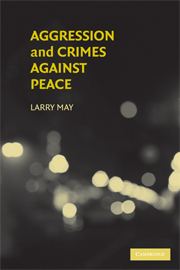Book contents
- Frontmatter
- Contents
- Acknowledgments
- PART A PACIFISM AND JUST WARS
- PART B RETHINKING THE NORMATIVE AD BELLUM PRINCIPLES
- PART C THE PRECEDENT OF NUREMBERG
- 7 Custom and the Nuremberg “Precedent”
- 8 Prosecuting Military and Political Leaders
- 9 Prosecuting Civilians for Complicity: The Krupp and I. G. Farben Cases
- PART D CONCEPTUALIZING THE CRIME OF AGGRESSION
- PART E HARD CASES AND CONCLUDING THOUGHTS
- Bibliography
- Index
7 - Custom and the Nuremberg “Precedent”
Published online by Cambridge University Press: 13 November 2009
- Frontmatter
- Contents
- Acknowledgments
- PART A PACIFISM AND JUST WARS
- PART B RETHINKING THE NORMATIVE AD BELLUM PRINCIPLES
- PART C THE PRECEDENT OF NUREMBERG
- 7 Custom and the Nuremberg “Precedent”
- 8 Prosecuting Military and Political Leaders
- 9 Prosecuting Civilians for Complicity: The Krupp and I. G. Farben Cases
- PART D CONCEPTUALIZING THE CRIME OF AGGRESSION
- PART E HARD CASES AND CONCLUDING THOUGHTS
- Bibliography
- Index
Summary
International law is not statutory. It is in part defined by and described in treaties and covenants among the powers of the world. Nevertheless, much of it consists in practices, principles, and standards which have become developed over the years and have found general acceptance among the civilized powers of the world. It has grown and expanded as the concepts of international right and wrong have grown. It has never been suggested that it has been codified, or that its boundaries have been specifically defined, or that specific sanctions have been prescribed for violations of it.
“The Ministries Case Judgment”There are currently no prosecutions of individuals for having committed the crime of aggression or what is sometimes called the crime against peace. One fairly good reason for this fact is that there is no treaty or international statute that defines this international crime and sets out the elements that a prosecutor would have to prove to convict someone of violating it. There were prosecutions by the International Military Tribunal at Nuremberg, and the subsequent trials at Nuremberg just after World War II, but for various reasons that I will rehearse in this chapter, the Nuremberg prosecutions for crimes against peace have not been seen as establishing a “precedent.” I will examine what the basis of such trials was said to be and why there has been such reluctance to use similar rationales today.
- Type
- Chapter
- Information
- Aggression and Crimes Against Peace , pp. 141 - 162Publisher: Cambridge University PressPrint publication year: 2008



